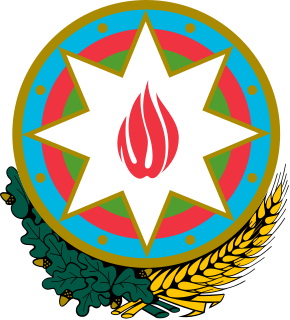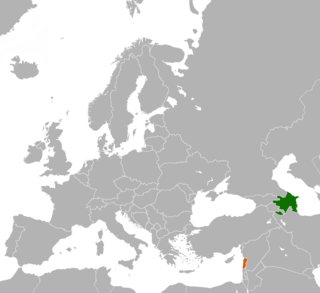
The Politics of Azerbaijan takes place in a framework of a semi-presidential republic, with the President of Azerbaijan as the head of state, and the Prime Minister of Azerbaijan as head of government. Executive power is exercised by the president and the government. Legislative power is vested in both the government and parliament. The Judiciary is nominally independent of the executive and the legislature.

Heydar Alirza oglu Aliyev was a Soviet and Azerbaijani politician who served as the third president of Azerbaijan from October 1993 to October 2003. Originally a high-ranking official in the KGB of the Azerbaijan SSR, serving for 28 years in Soviet state security organs (1941–1969), he led Soviet Azerbaijan from 1969 to 1982 and held the post of First Deputy Premier of the Soviet Union from 1982 to 1987.

"Azərbaycan marşı" is the national anthem of Azerbaijan. The music was composed by Uzeyir Hajibeyov, with lyrics by poet Ahmad Javad. The government officially adopted the anthem in 1920, with the passage of the decree, "On the State Hymn of the Republic of Azerbaijan". In 1992, after the fall of the Soviet Union, Azerbaijan's government officially restored "Azərbaycan Marşı" as the national anthem.

East Azerbaijan Province is one of the 31 provinces of Iran. It is located in Iranian Azerbaijan, bordering with Armenia, Republic of Azerbaijan, Ardabil Province, West Azerbaijan Province, and Zanjan Province. The capital of East Azerbaijan is Tabriz. East Azerbaijan Province is in Regions 3 of Iran, with its secretariat located in its capital city, Tabriz.

The president of the Republic of Azerbaijan is the head of state of Azerbaijan. The Constitution states that the president is the embodiment of executive power, commander-in-chief, "representative of Azerbaijan in home and foreign policies", and "shall have the right of immunity [from prosecution]." The president rules through his executive office, the Presidential Administration, consisting of a group of secretaries and departmental ministers. Additionally, there is a Cabinet of Ministers regarding economic and social policy and a Security Council regarding foreign, military, and judicial matters.

Elections in Azerbaijan gives information on election and election results in Azerbaijan.
The Azerbaijan Democrat Party, also known as ADP, is a conservative political party in Azerbaijan.

The main religion in Azerbaijan is Islam, though Azerbaijan is the most secular country in the Muslim world. Estimates include 96.9% and 99.2% of the population identifying as Muslim. Most are adherents of Shia Islam, with a minority (15%) being Sunni, differences traditionally have not been defined sharply. Most Shi'a are adherents of orthodox Ithna Ashari school of Shi'a Islam. Following many decades of Soviet atheist policy, religious affiliation is nominal in Azerbaijan and Muslim identity tends to be based more on culture and ethnicity than religion. Traditionally villages around Baku and Lenkoran region are considered stronghold of Shi'ism. In some northern regions, populated by Dagestani (Lezgian) people, Sunni Islam is dominant.

Baku State University (BSU) is a public university located in Baku, Azerbaijan. Established in 1919 by the Parliament of Azerbaijan Democratic Republic, the University started with faculties of history and philology, physics and mathematics, and law and medicine, with an initial enrollment of 1094. The first rector of BSU was V.I.Razumovsky, a former professor of surgery at Kazan University.

Western Caspian University is a private university in Baku, Azerbaijan. Founded in 1991 by Husein Baghirov, it has six schools, 25 majors, 180 faculty and approximately 1500 students. The university took its name because it is modeled after Western universities in style of instruction and values, the latter in response to some of the corrupt practices under the Soviet system. Much of the instruction is conducted in English.
Copyright law in Azerbaijan governs copyright in Azerbaijan. The status of copyright law and its protection is regulated by the Law of the Republic of Azerbaijan signed in 1996. The Law on Copyright and Related Rights regulates the relations that arise while creating or using scientific and literary works, as well as works of art. According to this law, adjacent rights to performances, phonograms, and the transfer of broadcasting and cable broadcasting organizations are also streamlined. The Law was amended in 2001, 2002, 2004, 2005, 2008, 2010 and 2013.
Arif Asadov is an Azerbaijani professional football coach and a former player.

Azerbaijani nationality law is regulated by the Constitution of Azerbaijan, as amended; the Citizenship Law of Azerbaijan and its revisions; and various international agreements to which the country is a signatory. These laws determine who is, or is eligible to be, an Azerbaijani national. The legal means to acquire nationality, formal legal membership in a nation, differ from the domestic relationship of rights and obligations between a national and the nation, known as citizenship. Nationality describes the relationship of an individual to the state under international law, whereas citizenship is the domestic relationship of an individual within the nation. Some countries use the terms nationality and citizenship as synonyms, despite their legal distinction and the fact that they are regulated by different governmental administrative bodies. Colloquially, as in most former Soviet states, citizenship is often used as a synonym for nationality, because nationality is associated with ethnicity. Azerbaijani nationality is typically obtained under the principle of jus sanguinis, i.e. by birth to parents with Azerbaijani nationality. It can be granted to persons with an affiliation to the country, or to a permanent resident who has lived in the country for a given period of time through naturalization.

The Ministry of Youth and Sports of Azerbaijan Republic is a governmental agency within the Cabinet of Azerbaijan in charge of regulating activities related to sports and youth development in Azerbaijan Republic. The ministry is headed by Farid Gayibov.
The 1995 Azerbaijani coup d'état attempt, also known as the Turkish coup in Baku, was a coup d'état attempt by members of the Azerbaijani military, led by Colonel Rovshan Javadov at the head of a detachment of Special Purpose Police Unit (OPON). The group aimed to take control of the country from president Heydar Aliyev and reinstall former president Abulfaz Elchibey. The coup was foiled when the Turkish President Süleyman Demirel became aware of elements in Turkey supporting the plot, and called Aliyev to warn him. On 17 March 1995, units of the Azerbaijani Armed Forces surrounded the insurgents' camp and assaulted it, killing Colonel Javadov. Reports in Turkey following the 1996 Susurluk scandal elaborated on support for the coup from elements in Turkey.
Most Azerbaijanis receive their information from mainstream television, which is unswervingly pro-government and under strict government control. According to a 2012 report of the NGO "Institute for Reporters’ Freedom and Safety (IRFS)" Azerbaijani citizens are unable to access objective and reliable news on human rights issues relevant to Azerbaijan and the population is under-informed about matters of public interest.

Healthcare in Azerbaijan is provided by public and private healthcare institutions and regulated through the Ministry of Healthcare.

Gender equality in Azerbaijan is guaranteed by the country's constitution and legislation, and an initiative is in place to prevent domestic violence. Azerbaijan ratified a United Nations convention in 1995, and a Gender Information Center opened in 2002. A committee on women's issues was established in 1998.

Diplomatic relations exist between Azerbaijan and the Netherlands.

Bilateral relations exist between the Republic of Azerbaijan and the Lebanese Republic in diplomatic, socio-economic, cultural and other spheres.











